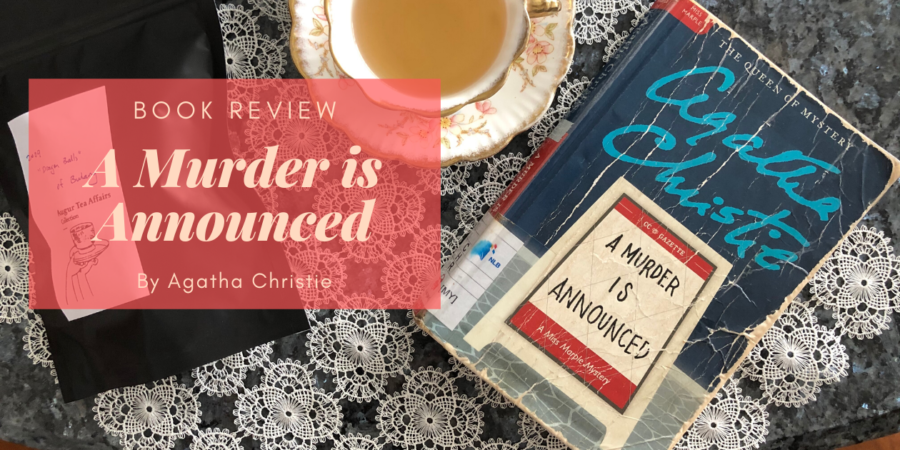It has taken me half a year but I am finally over my feelings towards Nemesis (a Miss Marple mystery). It helped that I read C.S. Lewis on why he reads – experience different views of life, not just views that I agree with. I’m glad that I gave Miss Marple another chance because apart from some gratuitous usage of the word “pussy” (in a very different way from its present meaning), the book was a fascinating mystery.
A Murder is Announced starts with precisely that: an announcement of murder in the local paper. Certain residents of Chipping Cleghorn, unable to resist their curiosity, pop down to the address in question: Little Paddocks. The residents of Little Paddocks, on the other hand, are certain that none of them put up that advertisement. The time comes, the lights go out, and when everyone can see again, a stranger lies dead from a gunshot, his gun by his side.
Since Detective-Inspector Craddock’s godfather is Sir Henry, Miss Marple’s name is brought up and lo and behold, the lady in question happens to be nearby. Miss Marple gladly offers to help investigate and the mystery is off to a great start.
Apart from the plot (which was great) and the amazingly varied characters, one thing I noticed about this book was that it did not shy away from portraying the darker side of life. Christie is often called a cosy mystery writer and while her books are comfort books to me, they aren’t completely unrealistic if you ask me. Although this is very much a village mystery with Miss Marple instead of Poirot, in this book alone, we can see:
- Changes in post-war society: Miss Marple talks to Craddock about how people are so much more globalised and how these changes have reached even the rural areas. People don’t require formal introductions to move into a village and people are coming back from all around the globe
- Poverty: At first glance, Dora Bunner comes across as a silly woman who Letitia Blacklock rescues from poverty. But it’s clear that she knows what it means to live hand to mouth, as she says in this moving speech “But how many meals have those people ever missed? They don’t know what it is – nobody knows who hasn’t been through it – to be really hungry. Bread, you know, a jar of meat paste, and a scrape of margarine. Day after day, and how one longs for a good plate of meat and two vegetables. And the shabbiness. Darning one’s clothes and hoping it won’t show. And applying for jobs and always being told you’re too old. And then perhaps getting a job and after all one isn’t strong enough. One faints. And you’re back again. It’s the rent – always the rent – that’s got to be paid – otherwise you’re out on the street.” No wonder Dora Bunner, silly as she is, is so grateful and so appreciative for the furniture Letitia Blacklock tells her she will leave to her and does her best to be as helpful as possible, even when she isn’t! The dialogue where Miss Marple and Dora talk about her past is the most powerful one in the book for me, and really gave depth to Dora’s character.
- Loneliness & Old Age: Miss Marple, at a funeral, says that “One is alone when the last one who remembers is gone. I have nephews and nieces and kind friends – but there’s no one who knew me as a young girl – no one who belongs to the old days. I’ve been alone for quite a long time now.” Indeed, the plot hinges on the fact that people want others who can remember the past with them.
When you put all of these together, you get a society that, although it looks peaceful and calm on the outside, is actually grappling with change and has to deal with the progression of time like the rest of us. The only part of the book which I thought wasn’t as deftly handled were the scenes with foreigners, namely Mitzi the maid. She’s portrayed as hysterical and paranoid, always afraid that someone is after her. But, the book does acknowledge that Mitzi has gone through hard times and that she’s acting this way to protect herself, which makes sense to me.
Overall, I was pleasantly surprised by how Christie managed to bring the village of Chipping Cleghorn to life through her characters and by touching on real life issues. Murder by Candlelight was quite wrong when it writes that “Agatha Christie and Dorothy Sayers never give their readers the courage to look real evil-doing in the face” because they do. This book is proof of that.


Ah yes, the British attitude towards foreigners …
The more I learn about empires, the less surprised I am (the Chinese were pretty much the same, but perhaps using different terms)
Yes, I think it is a human tendency, definitely.
This book sounds really good! It’s been a long time since I’ve read a Christie book, and I’m really curious about this one now. Thank you for sharing those themes you noticed!
I enjoyed this one! I’d recommend it if you’re going back to Christie after a while (: Or one of the Poirot novels!
I will have to add this to my to read list. I think this is one Christie I missed reading.
It’s definitely one I would recommend!